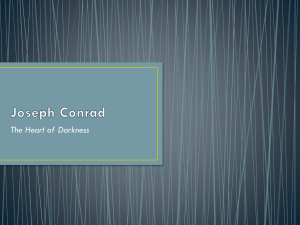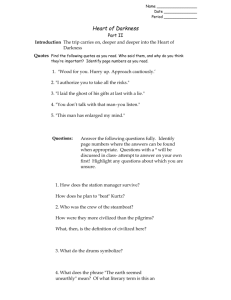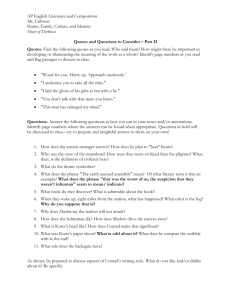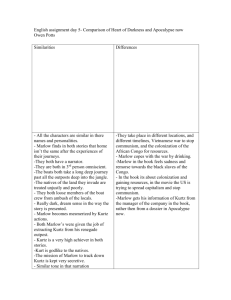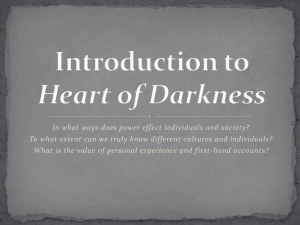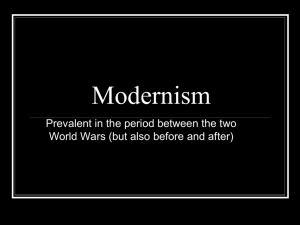HHeart of darkness - To-read-or-not-to-read
advertisement
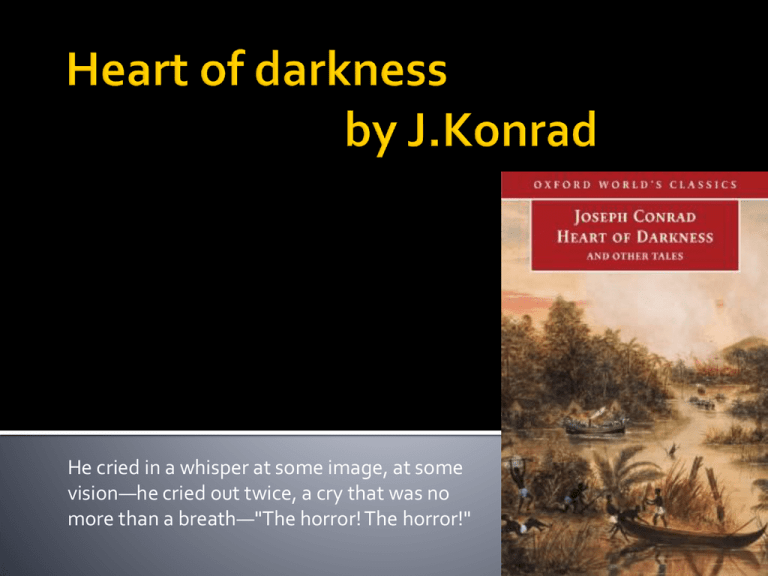
He cried in a whisper at some image, at some vision—he cried out twice, a cry that was no more than a breath—"The horror! The horror!" Born Josef Teodore Konrad Nalecz Korzeniowski, in Podolia, Ukraine, in 1857. In 1874, Conrad went to Marseilles France and joined the Merchant Navy Conrad eventually became a British merchant sailor and eventually a master mariner and citizen in 1886. He traveled widely in the east. He took on a stint as a steamer captain (1890) in the Congo, but became ill within three months and had to leave. Conrad retired from sailing and took up writing full time. Writing took a physical and emotional toll on Conrad. The experience was draining The title can be understood both literally and symbolically. Literally, the continent is dark and forboding, with an unexplored heart (the Congo) in its depths. Symbolically, the "heart of darkness," is the journey of Marlow and his companions. Their travels can be understood as a journey into the exploration of the darkness of the men's souls (sin) , reflected back to them by the "dark continent" which they explore. Their journey out of the Congo can be interpreted as a parallel to man's redemption from sin, or as the dualism of man. Marlow - The protagonist of Heart of Darkness. Kurtz - The chief of the Inner Station and the object of Marlow’s quest. General manager - The chief agent of the Company in its African territory, who runs the Central Station. Brickmaker - The brickmaker is a favorite of the manager and seems to be a kind of corporate spy. Chief accountant - An efficient worker who seems to have accomplished anything: he has trained a native woman to care for his wardrobe. Pilgrims - The bumbling, greedy agents of the Central Station. Cannibals - Natives hired as the crew of the steamer, a surprisingly reasonable and welltempered bunch. Russian trader - A Russian sailor who has gone into the African interior as the trading representative of a Dutch company. Helmsman - A young man from the coast trained by Marlow’s predecessor to pilot the steamer. Kurtz’s African mistress - A fiercely beautiful woman who seems to exert an undue influence over both Kurtz and the natives around the station, and the Russian trader points her out as someone to fear. Kurtz’s Intended - Kurtz’s naïve and long-suffering fiancée, whom Marlow goes to visit after Kurtz’s death. Aunt - Marlow’s doting relative, who secures him a position with the Company. She is an example for Marlow of the naïveté and illusions of women. Fresleven - Marlow’s predecessor as captain of the steamer. Marlow expressed a desire to go to Africa to his Aunt who got him a position as a captain of a steamboat of an ivory company. Marlow travels to Africa and finds the blacks being poorly treated and ordered to do meaningless work by the whites. He continues down the river and becomes surrounded by savages in the fog. Marlow is frightened but the savages don’t do anything... until the fog rises. The savages attack , the arrows s have little effect on Marlow’s men, only Marlow’s helmsman dies. Marlow blows the whistle and mysteriously, all the savages retreat in fear. Kurtz is very ill and needs to be taken back to England, but he does not want to go. Kurtz is worshipped by the natives and completely exploits them. Kurtz tries to escape to the natives but Marlow catches him and takes him back to the steamboat head back for England. While still on the river, Kurtz dies saying, “The horror, the horror.” Marlow returns to England. He visits Kurtz’s intended who is still in mourning a year after Kurtz’s death. She still remembers Kurtz as the great man he was before he left, and Marlow doesn’t tell her what he had become before he dies. Primitivism As the crew make their way up the river, they are traveling into the “heart of darkness.” The contradiction, however, is that Marlow also feels as if he were traveling back in time. Imperial Authority Whatever the conditions in Africa may be, all of the characters agree that they are different from those of Europe. There is a feeling of anything-goes vigilantism that shifts the balance of power from the stewards in a “civilized” state (police, doctors, bureaucrats) to whoever is most threatening. Groupthink and Stock Characters This novella is unusual in that the author does not name most of the characters in his book, other than assigning them titles that describe their larger organizational goals. Illness Illness is a major factor in this novella. It appears in physical and mental forms. Marlow is hired to replace a man who committed suicide, and another instance of suicide is announced by a somber Swedish man. Framed Narrative Narrator begins Marlow takes over Narrator breaks in occasionally Marlow is Conrad’s alter-ego, he shows up in some of Conrad’s other works including “Youth: A Narrative” and Lord Jim Marlow recounts his tale while he is on a small vessel on the Thames with some drinking buddies who are ex-merchant seamen. As he recounts his story the group sits in an allencompassing darkness and pass around the bottle. Darkness Primitive Impulses (Kurtz, previous captain, etc.) Cruelty of Man (Kurtz and Company) Immorality/Amorality (Kurtz) Lies/Hypocrisy (Marlow chooses Kurtz evil versus Company’s hypocritical evil) Imperialization/Colonization (Belgian Company) Cruelty of Man Greed Exploitation of People Role of Women Civilization exploitive of women Civilization as a binding and self-perpetuating force Physical connected to Psychological Barriers (fog, thick forest, etc.) Rivers (connection to past, parallels time and journey) Many different interpretations have been put on this book: Some see it as an attack on colonialism and a criticism of racial exploitation Some see Kurtz as the embodiment of all the evil and horror of the capitalist society. Others view it as a portrayal of one man’s journey into the primitive unconscious where the only means of escaping the blandness of everyday life is by self degradation. Apocalypse Now is a film that was directed by Francis Ford Coppola starring Martin Sheen, Robert Duvall and Marlon Brando This film was based on Conrad’s Heart of Darkness. Coppola takes the story to Vietnam. Captain Willard (Marlow) is sent on a mission to kill Colonel Kurtz who has gone renegade
